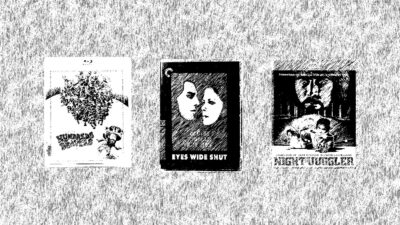In this seasonal series, the good people of Crossfader detail what they want pop culture to get them for Crossmas this year. This time around, it’s . . .
To Kill Alt Rock
In August, a Noisey interview with Brandon Flowers and Ronnie Vannucci of The Killers (Nominee for Best Rock Album, 2005), produced the following quote when asked if there could be another rock band that ever got big “largely through word of mouth.” Here’s the answer:
“It could happen—but there hasn’t been anybody good enough. If there was a band like the Strokes, or Interpol, people would talk. [Points outside to Brooklyn] If there were some kids out there right now playing ‘Obstacle 1’ tonight, I would hear about it, you would hear about it.
But there isn’t.”
Flowers’ sentiment here is nothing new, but it might surprise some to hear it from someone so young. The Killers are certainly still an active participant in the music industry, but their peak years appear to be behind them, and when we’re making “Best of Each Decade” lists in the year 2099, The Killers will likely be more fondly remembered for their work in the aughts more than WONDERFUL WONDERFUL. Regardless of whether he’s right or not, the quote is undeniably tone-deaf, and makes Flowers sound like the dickheads who blather on about how music will never be as good as it was when Zeppelin or the Beatles (or whatever old-school music titan you choose) were around. You’ve probably heard at least one older music fan say at some point in your life, “where are the ‘real’ rock and roll bands?” They’re exactly where they were before; on the fringes of genre convention, stumbling onto new sounds while honoring the music that inspired them. Calling “alternative” rock bands anything but rock bands paints those groups, who are in reality doing the heavy lifting while already established groups collect giant checks, as amateurs and tinkerers, undeserving of legitimate respect. This Crossmas, I am begging Jimi Hendrix and Andrew Wood and David Bowie and every other rock and roll god that ever lived to make the world realize that the concept of “Alternative Rock” is outdated, unnecessary, and actively harmful to the music that I love so dearly.
There’s obviously more to the “lack” of good rock bands than Flowers’s statement suggests. 2017 was the year that hip hop finally bested rock music on the sales charts, and the social relevance of hip hop has dwarfed that of rock music for quite a while. There are a lot of possible causes of this—I personally think hip hop as a whole is better suited to streaming and singles-based listening than rock music, and I also think that there’s a lot more creative, youthful energy in hip hop than in rock, even if you take away the “alternative” tag. What’s more concerning if you like music that could, under any sort of broad stroke, be considered “rock” is that Flowers’s attitude is the first step toward the kind of elitist gatekeeping that absolutely will kill rock music. It says two things: one, his definition of what “rock” is is narrow enough to exclude some of the best artists of the last decade, and two, his own success has convinced him, at least on some level, that great artists don’t slip through the cracks, which we all know is completely false.

CASE IN POINT
Even if you look again at the Alternative and Rock winners and nominees at the Grammys, the few bands who do get recognized for what they do, there’s a noticeable pattern of the “rock” title only being bestowed on those who have achieved mainstream success. Some of the easy ones to spot are the aforementioned Foo Fighters (1x Best Alt. Nominee, 6x Best Rock Nominee), Coldplay (2x Alt, 3x Rock), Green Day (1x Alt, 2x Rock), and Beck (6x Alt, 1x Rock). This part is consistent with the Recording Academy’s definition of the Alternative and Rock categories, and they do deserve some credit for recognizing that the tastes of the public change over time. The problem is that they don’t notice it until that change has come and gone, and the public is into something else entirely. It’s also worth noting that both of the bands that Brandon Flowers cited as “good” in the above quote have never been nominated for a single Grammy award, Rock or Alternative or otherwise.
Though the term “alternative rock” has been in use since the ‘80s and originally described a distinct movement in rock music, spearheaded by groups like R.E.M., Violent Femmes, and The Replacements, it quickly became more of a catch-all term as other rock subgenres (noise rock, industrial, post-punk, and grunge), including other subgenres like punk that had already found some success and achieved mainstream popularity. The Grammy Awards, which had previously only awarded a nebulous “Rock” category, started incorporating more specific categories in 1989, when categories for Best Metal Performance and Best Hard Rock Performance (won by Metallica and Living Colour, respectively) were added to the bill. An award for Best Alternative Music Performance, which eventually became Best Alternative Music Album, was added in 1991, with Sinead O’Connor as the first winner. A Best Rock Album category was added in 1995, which provided a more clear picture of what was considered “rock” vs. “alternative” by the music industry.
Initially, there was a fair amount of consistency, and the line between the categories isn’t too hard to find. Early nominees in Best Alternative usually had a clear punk, new wave, or folk-rock bent, while Best Rock nominees were more in line with what had been popular between the ‘60s and the mid-‘80s. The Academy considered Pearl Jam a “rock band,” while Nirvana was consistently in the alternative. Then, around 1997, things start getting dicey. No Doubt’s TRAGIC KINGDOM, a clearly ska-heavy record, mixed into the Rock category. Foo Fighters became the first group to get nominated in both categories in 1998 with THE COLOUR AND THE SHAPE. In 1999, Garbage and Hole, two bands that (in my humble opinion) fit pretty clearly into “alternative rock,” were nominated for Rock Album. And then, from there, it’s a giant mess of cross-pollination between the two categories, and the established precedent for the difference between the two starts to fade. Coldplay has won both categories despite never changing their sound significantly. Cage the Elephant miraculously went from an alternative band to a red-blooded, bona fide rock and roll band in one album. I won’t inundate you, dear reader, with an entire list of the bizarre discrepancies in what’s alt and what’s not, but it’s worth doing some research.

But there’s NOTHING bizarre about this stone-cold classic winning Best Rock Album in 2000!
Perhaps one way to solve this conflict between the old guys rambling about Pink Floyd and the kids who listen to bands that sound suspiciously similar to Pink Floyd is to refocus how we talk about and listen to rock music. The alternative/rock binary also attempts to erase the links between modern musicians and the music they grew up loving. Rock music is segregated on the radio by the decade it comes from. Even though James Murphy is clearly a huge fan of, and strongly influenced by, New Order, it’s not common to hear them on the same radio format. An even better example might be The War on Drugs, one of the only distinctly 2010s bands to be given the Rock stamp of approval from the get-go. TWOD is famous for wearing their influences on their sleeves, and as a result they’ve been embraced by young and old alike. But, in order to get there, they had to make it about as obvious as possible that Adam Granduciel grew up loving the heck out of his Springsteen and Dire Straits records. In a Sirius XM-driven world, it’s rare for radio to do any actual curation work, opting instead to keep people in their musical bubble.
I recently got to see The National play in Portland at the Arlene Schnitzer Concert Hall. Most wouldn’t think of The National as a hard rocking band, and many of their records support that idea, but they have an entirely different energy live. Many of their songs go from stately and demure on record to volatile, almost dangerous emotional outbursts on stage. If I had to use one word to describe that show, I would happily tell anyone who will listen that it rocked. I would have loved to bring one of the Facebook commenters who insists that Metallica is the only good rock band left to that show. I would have loved to sit Brandon Flowers down to watch LCD Soundsystem play “Call the Police” on Saturday Night Live, because I know a good rock band when I see one, and those are bands that, plain and simple, fucking ROCK.

To be fair, you probably wouldn’t expect these guys to include leaping from drumsets as a regular part of their show
On some level, none of this matters. No one has taken the Grammys seriously for years, and radio is a slowly dying medium for music. But it would do all musicians a lot of good for the mainstream music media to acknowledge that Radiohead listened to The Beatles just as much as everyone else, and that all of the ever-increasing subgenres of rock music all share common ancestors. The digital era has allowed our tastes to become hyper-specific. If you really wanted to, you could only listen to one subgenre of metal and still have plenty of songs to listen to and plenty of artists to see live. But the reality of art is that it does not have to innovate, and sometimes it shouldn’t. Sometimes it’s better to focus on the parts of it that aren’t new, because the demand for music and films and whatever else will not end. Rock and roll won’t die just because it’s grown up a little bit, and the music industry needs to grow up and recognize that.














Comments